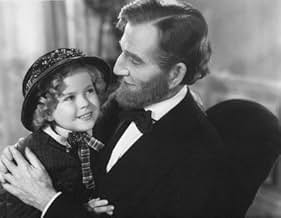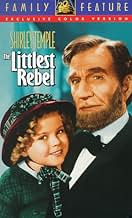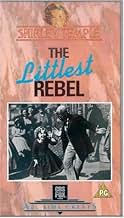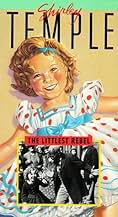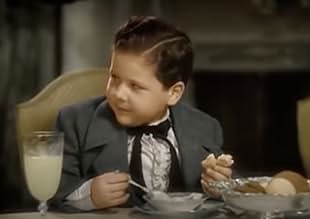अपनी भाषा में प्लॉट जोड़ेंShirley Temple's father, a rebel officer, sneaks back to his rundown plantation to see his family and is arrested. A Yankee takes pity and sets up an escape. Everyone is captured and the off... सभी पढ़ेंShirley Temple's father, a rebel officer, sneaks back to his rundown plantation to see his family and is arrested. A Yankee takes pity and sets up an escape. Everyone is captured and the officers are to be executed. Shirley and "Bojangles" Robinson beg President Lincoln to interc... सभी पढ़ेंShirley Temple's father, a rebel officer, sneaks back to his rundown plantation to see his family and is arrested. A Yankee takes pity and sets up an escape. Everyone is captured and the officers are to be executed. Shirley and "Bojangles" Robinson beg President Lincoln to intercede.
- निर्देशक
- लेखक
- स्टार
- पुरस्कार
- कुल 4 जीत
- Sgt. Dudley
- (as Guinn Williams)
फ़ीचर्ड समीक्षाएं
As a professional musician I am astonished at her near perfect execution of complex syncopated dance routines with Bill Robinson. It is evident that she is really having fun during these numbers and surely was an attentive student. When she sings, her voice, although not a trained voice (thank goodness) is right on pitch. It is a natural, pleasant voice, free of any coaching. She really sings the lyric, (something that most "pro" singers could stand a lesson in) and not just the song. I never really stopped to listen to "Believe me if all these endearing young charms" but her non-treatment forced me to hear it. It's a very touching song.
How I would enjoy a chat with her to pick her brain. She really was a "perfect storm" as child stars go and I will certainly be screening more of her films....for my...AHEM...daughter, of course.
The black people are not only less intelligent than the whites (notice the girl so dumb she can't even remember a single line her mother told her to memorise to impress the young white child star - or perhaps she's just so nervous in the presence of the superior species that she can't remember), but they're completely happy being enslaved.
They absolutely love being told what to do by the six year old landowner's daughter, and the neighbourhood slaves just wait around for young Shirley to lavish some attention on them.
The thing I most regret about the film was that they forced the blacks to dance and entertain their white hosts like a bunch of chained elephants or circus freaks.
Its always a bad sign when the civil war is portrayed as a distruption to the desired state of affairs, as it is here and in Gone with the Wind.
1/5
Only youngsters, who don't yet understand that the only difference between white folks and black folks is skin pigment, which only evolved from a group of people living in an ultra-sunny climate for years, will be able to enjoy this film. But perhaps its better for society if you don't show it to them - the young are so impressionable, after all.
UPDATE: Can I point out that I've noticed people don't like this review, and I'm not surprised; its intentions were so innocent, it feels a shame to accuse it of causing offense, but unfortunately, I'd still suggest this one not be shown to impressionable kids for the reasons I have outlined above.
The story is simple. Shirley T plays a little Southern girl named Virgie Cary a adorable moppet who seems to hold the social graces that would put Emily Post to shame. Because she is so cute and polite, everyone finds her irresistible. Oh! She is also a TERRIFIC tap dancer to boot! One sunny afternoon (April 12th) while she is celebrating her birthday, news flies in the door that Fort Sumter was fired upon and The War between the States has begun! Virgie is the child of Southern parents on a beautiful plantation with the happiest bunch of slaves that you ever seen---so we know what side her father will fight for.
Life for Virgie changes somewhat after that. Like any child in the Civil War, she misses her father who has gone off to battle. But Virgie has incredible spunk and bravery when she confronts the "Yankee" army and actually seems to want to do battle with them when some of the soldiers get mean with her and try to steal from her home and pushes her mother roughly down the stairs. Luckily, her bravery and stubborn pluck captures the heart of a Union Commander who later tries to help her father. When Virgie's mother is stricken with an illness and dies, her father is captured and the kind Union Commander is also implicated. There is only one person who can save them....Can Virgie charm the socks off of Abraham Lincoln in Washington D.C and get a reprieve for them? African American's will not view this movie favorably because it shows a preposterous view of the treatment of slavery. The slaves seemed so happy that they don't want to leave. The Cary's seem to be kind slave owners---the slave quarters are furnished tastefully like a roadside motel. There are no beatings or mention of abuses. Of course, there are dreadful black stereotypes like John Henry.
But the most interesting actor besides Shirley T is Bill "Bojangles" Robinson whom I consider one of the greats in tap dancing. Temple and Robinson enjoyed a very close friendship outside the studio. It was said when Temple saw Bill Robinson on a movie set, she had a mad compulsion to run up to him, take him by the hand, tug at him and look into his eyes and smile. When Bill Robinsonlooked down and saw her tugging at his hand, he couldn't resist her childish charm and smiled back at her. Temple maintained that "Uncle Billy" was the one adult who never treated her like a child but as an equal adult. Robinson said that Temple was one of the most talented young person when it came to dance--all he had to do was show her a routine twice and she picked it up immediately. Robinson also displayed a fatherly protective figure with Temple. A story was said that when Temple married John Agar, Robinson congratulated him but said "Be good to my little girl or I'll kill you" If you watch the interaction between these two on film, you could see Shiley Temple's eyes light up like a Christmas tree. I am sure that they felt some type of respect for each other off screen that carried into their outside lives. Relationships between black and white actors were not forbidden at that time but they were not encouraged. But we could say Temple and Robinson have been dubbed the first inter-racial couple on screen.
Despite the false picture of slavery, The Littlest Rebel entertains us thanks to the talents of Bill Robinson and Shirley Temple. There is a tap dancing scene halfway in the picture that can't be missed. Sure, the plot is campy and corny, and Shirley's sugar sweet demure is gut wrenching---but for some reason it entertains.
The second is a chance to talk to your children about the way black characters and white characters interact in this film. Some younger children may be confused by the divide between the black characters and the white characters (especially those who attend racially-diverse schools,) but this is a good time to explain to them the racist attitudes of the time period, and ask them how it makes them feel.
The best way to combat racism is not to sweep it under the rug, but to teach children where we were, how far we've come, and how far we still need to go. Give children the credit they deserve, they will understand.
This film is a perfect opportunity to relate to your children and instill guidance.
That's because it has a great mixture of drama, comedy, song/dance and suspense. Almost all the characters are likable. The two dances scenes with Temple and Bill Robinson are excellent....a joy to watch. I don't know if Shirley ever looked cuter than in this film. She runs the gamut of emotions in here quite frequently.
The 74-minute story never has a lull. John Boles and Karen Moreley are people you root for, Willie Best provides good comedy and there is a surprising amount of suspense.
Overall, however, this is simply a sweet, sentimental film that leaves you feeling good after watching it.....and what's wrong with that?
क्या आपको पता है
- ट्रिवियाBoth John Boles and Bill Robinson nearly drowned while trying to cross a raging, 15-foot river for an escape scene that was cut from the film.
- गूफ़When the Union soldiers are caught looting, the commanding officer orders them to be flogged. The US Army according to the "History of the United States Army" stopped flogging at the beginning of the Civil War in 1861--this scene is obviously later in the war as Union forces are occupying the south.
- भाव
Virginia 'Virgie' Cary: [singing] Oh, I eat watermelon and I have for years. Sing Polly-Wolly-Doodle all the day! I like watermelon but it wets my ears. Sing Polly-Wolly-Doodle all the day!
- इसके अलावा अन्य वर्जनAlso available in a computer colorized version.
- कनेक्शनFeatured in Of Black America: Black History: Lost, Stolen or Strayed (1968)
- साउंडट्रैकPolly Wolly Doodle
(1880) (uncredited)
Traditional
Modified Music by Sidney Clare (1935)
Modified Lyrics by Buddy G. DeSylva (1935)
Sung by Shirley Temple with Bill Robinson
Reprised at the end by Shirley Temple
टॉप पसंद
- How long is The Littlest Rebel?Alexa द्वारा संचालित
विवरण
- रिलीज़ की तारीख़
- कंट्री ऑफ़ ओरिजिन
- भाषा
- इस रूप में भी जाना जाता है
- La pequeña rebelde
- फ़िल्माने की जगहें
- उत्पादन कंपनी
- IMDbPro पर और कंपनी क्रेडिट देखें
- चलने की अवधि1 घंटा 13 मिनट
- रंग
- पक्ष अनुपात
- 1.37 : 1
इस पेज में योगदान दें



